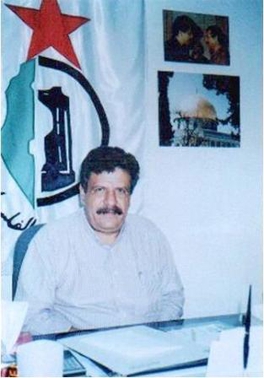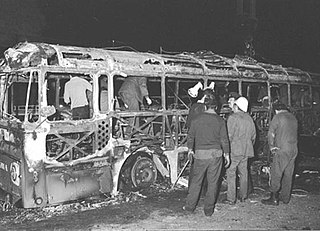Related Research Articles
The Japanese Red Army was a militant communist organization active from 1971 to 2001. It was designated a terrorist organization by Japan and the United States. The JRA was founded by Fusako Shigenobu and Tsuyoshi Okudaira in February 1971, and was most active in the 1970s and 1980s, operating mostly out of Lebanon with PFLP collaboration and funding from Muammar Gaddafi's Libya, as well as Syria and North Korea.

Muhammad Zaidan aka Muhammad Abbas, sometimes known as Abu Abbas, was a founder of the Palestine Liberation Front (PLF) Organization.

Leila Khaled is a former Palestinian militant and member of the Popular Front for the Liberation of Palestine (PFLP). She is famous as the first woman to hijack an airplane.

Black September, also known as the Jordanian Civil War, was an armed conflict between Jordan, led by King Hussein, and the Palestine Liberation Organization (PLO), led by chairman Yasser Arafat. The main phase of the fighting took place between 16 and 27 September 1970, though certain aspects of the conflict continued until 17 July 1971.

In December 1973, Fatah, a Palestinian military organization executed series of attacks originating at Rome-Fiumicino Airport in Italy which resulted in the deaths of 34 people. The attacks began with an airport-terminal invasion and hostage-taking, followed by the firebombing of a Pan Am aircraft and the hijacking of a Lufthansa flight.
Patricio José Argüello Ryan, commonly referred to simply as Patrick Argüello, was a Nicaraguan-American Marxist–Leninist militant. He was a member of the Sandinista National Liberation Front (FSLN), and is best-known for his unsuccessful hijacking of El Al Flight 219 alongside Palestinian militant Leila Khaled on September 6, 1970. Flight 219 was an international civilian passenger flight from Tel Aviv to New York City that was hijacked by the duo shortly after it took off from a stopover in Amsterdam. Argüello and Khaled, acting on part of a larger series of hijackings by the Popular Front for the Liberation of Palestine (PFLP), ultimately failed to take control of the plane due to heavy resistance from the passengers and security, who subdued the duo after pilot Uri Bar-Lev had thrown them off balance by putting the plane into a steep nosedive. Bar-Lev then made an emergency landing at Heathrow Airport in London, where Argüello was shot multiple times, later succumbing to his injuries. The FSLN had agreed to support the PFLP's hijackings in exchange for guerrilla warfare training.

The coastal road massacre occurred on 11 March 1978, when Palestinian militants hijacked a bus on the Coastal Highway of Israel and murdered its occupants; 38 Israeli civilians, including 13 children, were killed as a result of the attack while 76 more were wounded. The attack was planned by the influential Palestinian militant leader Khalil al-Wazir and carried out by Fatah, a Palestinian nationalist party co-founded by al-Wazir and Yasser Arafat in 1959. The initial plan of the militants was to seize a luxury hotel in the Israeli city of Tel Aviv and take tourists and foreign ambassadors hostage to exchange them for Palestinian prisoners in Israeli custody.

Wadie Haddad, also known by the kunya Abu Hani, was a Palestinian militant, a leading member of the Popular Front for the Liberation of Palestine. He organized several hijackings of international civilian passenger aircraft in the 1960s and 1970s, the most infamous of which was the Entebbe hijacking, when Palestinian and German militants under his command held 106 hostages – primarily Israeli Jews, although four non-Israeli Jews were also held captive – on a flight from Israel to France after diverting it to Entebbe, Uganda.
An attack on the Saudi embassy in Khartoum took place on 1 March 1973. It was carried out by the Black September Organization. Ten diplomats were taken hostage. After President Richard Nixon stated that he refused to negotiate with terrorists, and insisted that "no concessions" would be made, one Belgian and two U.S. hostages were killed.

The Laju incident, also known as the Laju ferry hijacking, occurred on 31 January 1974 in Singapore. Four armed men from the terrorist groups Japanese Red Army and Popular Front for the Liberation of Palestine attacked the Shell oil refinery complex on Pulau Bukom and later hijacked the ferryboat Laju and took its five crew members hostage. The crisis was resolved after the Singapore government provided the terrorists safe passage to the Middle East in exchange for the release of the hostages.
The 1983–1988 Kuwait terror attacks were various pro-Iran terror attacks during the Iran–Iraq War. 25 people were killed and more than 175 people were wounded. Following the attacks, Kuwait's economy significantly suffered.

The El Al Flight 253 attack was a terrorist attack perpetrated by the Palestine Liberation Organization (PLO) against a Boeing 707 passenger plane while it was on the ground at a stopover in Athens en route from Tel Aviv, Israel, to New York City, United States in 1968.
Events in the year 1972 in Israel.
Events in the year 1970 in Israel.

Kuwait Airways Flight 422 was a Boeing 747 jumbo jet hijacked en route from Bangkok, Thailand, to Kuwait City, Kuwait on 5 April 1988, leading to a hostage crisis that lasted 16 days and encompassed three continents. The hijacking was carried out by several Lebanese guerillas who demanded the release of 17 Shi'ite Muslim prisoners being held by Kuwait for their role in the 1983 Kuwait bombings. During the incident the flight, initially forced to land in Iran, traveled 3,200 mi (5,100 km) from Mashhad in northeastern Iran to Larnaca, Cyprus, and finally to Algiers.

The Israeli Bangkok embassy hostage crisis occurred on 28 December 1972. It was a raid by a squad of four Palestinian militants, belonging to the Black September organization, on the Israeli embassy building in Bangkok in which the militants held six Israeli embassy staff hostage. After 19 hours of negotiations, the hijackers agreed to abandon the embassy in exchange for being flown to Egypt. The raid was one of a number of attacks that have been conducted against Israeli embassies and diplomats.

The Achille Lauro hijacking took place on 7 October 1985, when the Italian ocean liner MS Achille Lauro was hijacked by four men representing the Palestine Liberation Front (PLF) off the coast of Egypt, as she was sailing from Alexandria to Ashdod, Israel. A 69-year-old Jewish American man in a wheelchair, Leon Klinghoffer, was murdered by the hijackers and thrown overboard. The hijacking sparked the "Sigonella Crisis".

The hijacking of Lufthansa Flight 649 was an aircraft hijacking that took place between 22 and 23 February 1972. Eventually, all hostages on board the seized Boeing 747-230B were released when the West German government paid a ransom of US$5 million. The aircraft was hijacked by four men.
The 1973 Hellinikon International Airport attack was an attack at the Hellinikon International Airport at Athens, Greece. The two attackers were members of the Palestinian militant organization Black September. The militants used sub-machine guns and grenades against the passengers waiting in the passenger lounge. The attackers took hostages before they finally surrendered to the Greek police. It is believed that the gunmen wanted to hijack a plane, but they decided to attack when they were about to be searched by a Greek security inspector before boarding.
References
- ↑ "Guerrillas in Kuwait Seize Tokyo Envoy and Embassy Staff". The New York Times . 7 February 1974.